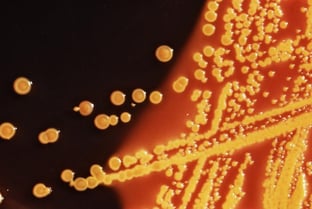
Escherichia coli, most commonly referred to as E. coli, is a common form of bacteria found in the environment, foods, and the intestinal tracts of animals. E. coli is very diverse, with some strains being harmless while others can cause a wide range of illnesses, including urinary tract infections, diarrhea, and pneumonia. With hundreds of thousands of deaths caused by E. coli each year, scientists have been diligently working to better understand this bacteria.
Recently, research investigators at the Institute for Genome Sciences (IGS) at the University of Maryland, Baltimore have determined the genetic makeup of a number of strains of E. coli, and identified a dangerous strain called Enteropathogenic Escherichia coli (EPEC) which causes diarrhea, a condition that leads to 1.7 million deaths annually.
The Baltimore researchers, led by David Rasko, PhD., obtained the genomes of seventy different E. coli strains from children infected with the bacteria. The strains obtained had effects that varied in severity, including some lethal strains, some strains that caused symptoms but were not lethal, and some that caused no symptoms at all. By analyzing the genetic differences amongst these strains, the researchers were able to identify the disease outcomes of each and categorize them based on genetic content. Although this study has not proven how genetic variations lead to different outcomes, it has shown a pattern that could help with further research. This led Rasko to believe that the lethality of E. coli depends on the interaction of a group of genes.
“These findings really help us map the associations between the bacteria and these illnesses in a new way. This kind of research would not have been possible a few years ago,” Dr. Rasko explained. “But with new advances, we can make these kinds of exciting discoveries.”
This new knowledge of different strains of E. coli and their varying levels of lethality can help future researchers gain a better understanding of how exactly E. coli causes severe damage, which could help with the development of more effective treatments for those infected by the bacteria.
For this study, the researchers in Maryland teamed up with other scientists from around the world, including investigators from the Gambia, Mali, Kenya and Mozambique in Africa, and from India, Pakistan, and Bangladesh in the Middle East. The children the E. coli genomes were collected from were all part of the Global Enterics Multi-Center study (GEMS).
The University of Maryland, Baltimore is a highly funded public research laboratory. This institution is making great progress in the fields of life science and medicine. Each year, millions of dollars are awarded from the National Institutes of Health (NIH), National Science Foundation (NSF), and other public and private institutions to help fund research. In the 2015 fiscal year, UMD Baltimore received $149,391,068 in funding from the NIH. Departments at the university receiving substantial amounts of this funding include:
-
Internal Medicine/Medicine - $35.3 millionRELATED ARTICLES:
Baltimore Bioresearchers Receive $10.7 Million for STD Research
 Microbiology/Immunology/Virology - $8.5 million
Microbiology/Immunology/Virology - $8.5 million- Biochemistry - $6.4 million
- Public Health and Preventative Medicine - $6.2 million
- Pharmacology - $6.09 million
The University of Maryland also opened a $200 million Proton Therapy Cancer Treatment Center in late 2015.
Biotechnology Calendar, Inc. has been producing highly reputable life science trade shows at more than fifty research universities across the U.S. for over twenty years. These shows bring hundreds of lab supply companies together with researchers to find the best new tools to help them further their work.
The 2nd Annual BioResearch Product Faire™ Event at the University of Maryland, Baltimore, an event that more than one hundred life science researchers are expected to attend, will be held on June 8, 2016.
To learn more about participating at this upcoming Baltimore event, visit the link below:


